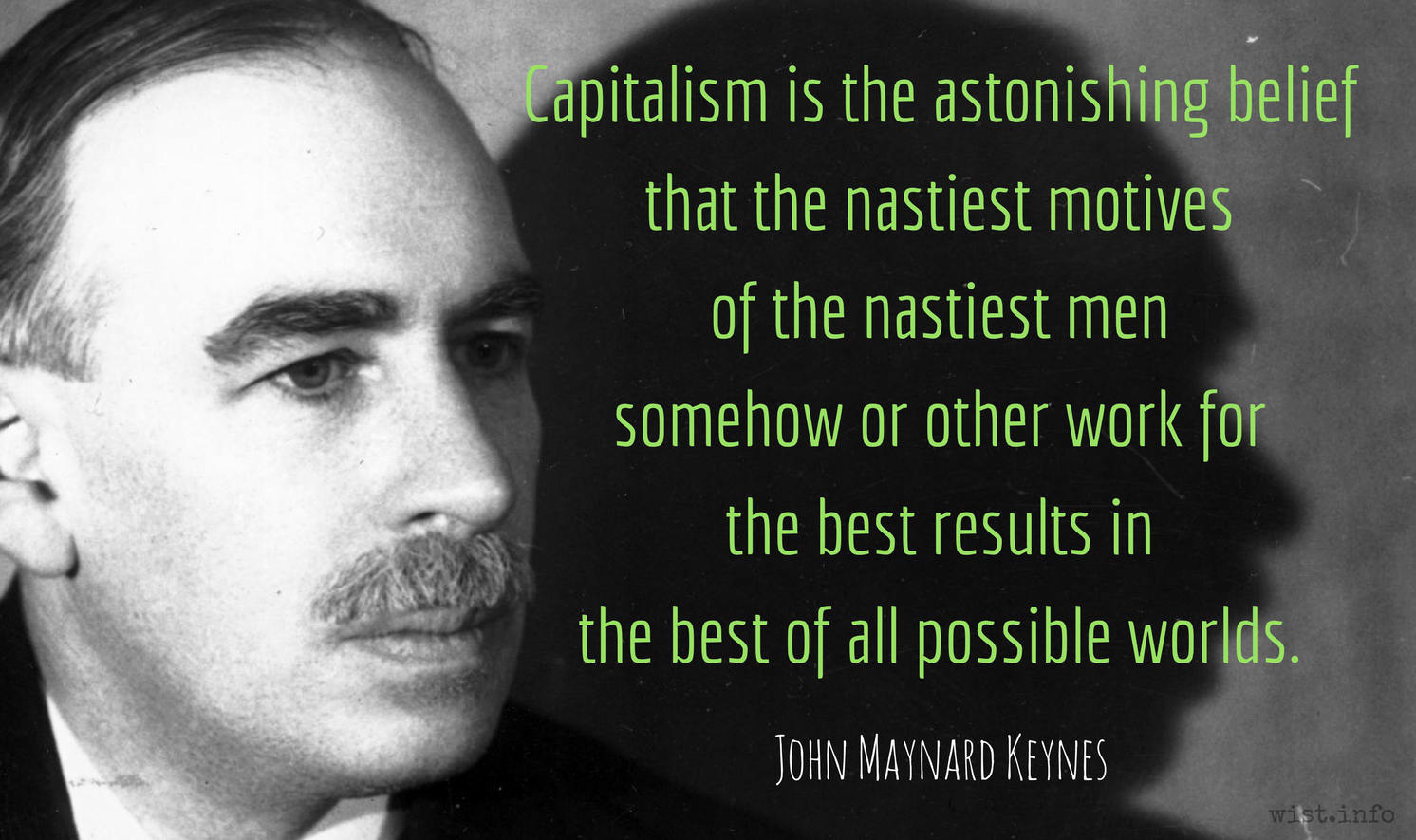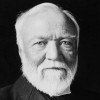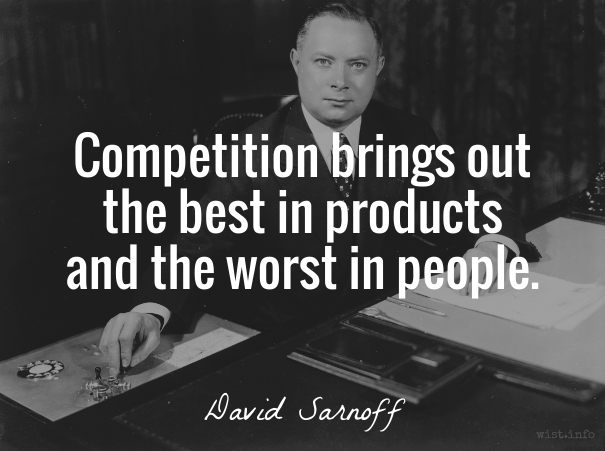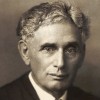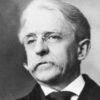Even within the university world, where the highest calling should be to spark the fires of intellectual exploration and to prepare young minds for engaged and productive participation in our democracy, the mandates of the market have attained prominence. The narrow quest for success crowds out the noble effort to be great — greatness understood as using one’s success to make the world a better place for all.
Cornel West (b. 1953) American philosopher, political activist, social critic
Democracy Matters, ch. 6 (2004)
(Source)
Quotations about:
capitalism
Note not all quotations have been tagged, so Search may find additional quotes on this topic.
Competition, as an ideal, had its part to play in the pioneer days of both industrialism and Western agriculture. But its day is past, and a new type of man is needed. The problem of producing goods in sufficient quantities to make general material well-being technically possible was solved by the men of the competitive era. The problem that remains is one of distribution, not of production; it can be solved only by economic justice, not by economic war. For this problem, the mentality of the competitive era is unfitted, since it is only to be solved by co-operation.
Bertrand Russell (1872-1970) English mathematician and philosopher
“Competitive Ethics,” New York American (1934-03-19)
(Source)
Books aren’t just commodities; the profit motive is often in conflict with the aims of art. We live in capitalism, its power seems inescapable — but then, so did the divine right of kings. Any human power can be resisted and changed by human beings. Resistance and change often begin in art. Very often in our art, the art of words.
Ursula K. Le Guin (1929-2018) American writer
Speech, accepting the National Book Foundation Medal (19 Nov 2014)
(Source)
On receiving the National Book Foundation Medal for Distinguished Contribution to American Letters at the 65th National Book Awards. Video of the speech.
Again we have deluded ourselves into believing the myth that Capitalism grew and prospered out of the Protestant ethic of hard work and sacrifice. The fact is that Capitalism was built on the exploitation and suffering of black slaves, and continues to thrive on the exploitation of the poor, both black and white, both here and abroad.
Martin Luther King, Jr. (1929-1968) American clergyman, civil rights leader, social activist, preacher
“The Three Evils,” Keynote Speech, National Conference for New Politics, Chicago (31 Aug 1967)
(Source)
When the judgment day comes, civilization will have an alibi: “I never took a human life, I only sold the fellow the gun to take it with.”
The crucial disadvantage of aggression, competitiveness, and skepticism as national characteristics is that these qualities cannot be turned off at five o’clock.
Margaret Halsey (1910-1997) American writer
The Folks at Home, “The Five O’Clock Shadow over the United States” (1952)
(Source)
What is the new loyalty? It is, above all, conformity. It is the uncritical and unquestioning acceptance of America as it is — the political institutions, the social relationships, the economic practices. It rejects inquiry into the race question or socialized medicine, or public housing, or into the wisdom or validity of our foreign policy. It regards as particularly heinous any challenge to what is called “the system of private enterprise,” identifying that system with Americanism. It abandons evolution, repudiates the once popular concept of progress, and regards America as a finished product, perfect and complete.
The ideal capitalism envisioned by advocates of the free market depends upon social virtues and wise policies that it does not itself generate.
Timothy Snyder (b. 1969) American historian, author
Black Earth: The Holocaust as History and Warning, “Conclusion: Our World” (2015)
(Source)
Few men, indeed, are so mad that they do not know when they are doing wrong. But so avid is their pursuit of goods that wrongdoing has become an element of all they do. To protest that fact is idle. Our politics, our business — little and big, our professions, our labor, are smitten in every facet with a corruption occasioned by reckless determination to make not just a reasonable profit but all the profit that can be wrung from every enterprise. Our commonest man, emulating his superiors, forges ahead with a brick on the safety valve of his conscience. Think over your morning paper in that light.
Envy is the gasoline on which American capitalism runs.
John Lahr (b. 1941) British-based American theater critic, author
“Lives in Limbo,” The New Yorker (26 Mar 2012)
(Source)
In a predatory economy, the rules imagined by the law and economics crowd don’t apply. There’s no market discipline. Predators compete not by following the rules but by breaking them. They take the business-school view of law: Rules are not designed to guide behavior but laid down to define the limits of unpunished conduct. Once one gets close to the line, stepping over it is easy. A predatory economy is criminogenic: It fosters and rewards criminal behavior.
John Kenneth Galbraith (1908-2006) Canadian-American economist, diplomat, author
“The Predator State,” Mother Jones (May/Jun 2006)
(Source)
Capitalism is the astounding belief that the most wickedest of men will do the most wickedest of things for the greatest good of everyone.
John Maynard Keynes (1883-1946) English economist
(Attributed)
Commonly attributed to Keynes, it is not found in his works. A more likely variant is "Capitalism is the extraordinary belief that the nastiest of men for the nastiest of motives will somehow work for the benefit of all," but this, too, is not established in Keynes' works. Also sometimes found attributed (without citation) to John Kenneth Galbraith.
George Schuster, Christianity and Human Relations in Industry (1951) quotes (uncited) Keynes referring to capitalism as "the astonishing belief that the nastiest motives of the nastiest men somehow or other work for the best results in the best of all possible worlds."
E. A. G. Robinson was a close colleague of Galbraith, and in his book Monopoly (1941), he said, "The great merit of the capitalist system, it has been said, is that it succeeds in using the nastiest motives of nasty people for the ultimate benefit of society." Robinson may be quoting Galbraith, or Galbraith may have anecdotally quoted Robinson.
More detailed discussion of this here, here, and here.
One strain in Protestant thinking has always looked to economic life not just for its efficacy in producing goods and services but as a vast apparatus of moral discipline, of rewards for virtue and industry and punishments for vice and indolence.
Richard Hofstadter (1916-1970) American historian and intellectual
“Pseudo-Conservatism Revisited — 1965,” sec. 3 (1965)
(Source)
There is no wilderness where I can hide from these things, there is no haven where I can escape them; though I travel to the ends of the earth, I find the same accursed system — I find that all the fair and noble impulses of humanity, the dreams of poets and the agonies of martyrs, are shackled and bound in the service of organized and predatory Greed! And therefore I cannot rest, I cannot be silent; therefore I cast aside comfort and happiness, health and good repute — and go out into the world and cry out the pain of my spirit!
Upton Sinclair (1878-1968) American writer, journalist, activist, politician
The Jungle, ch. 28 (1906)
(Source)
One is reminded of the dialectical definition, by the wry Polish intellectual, of capitalism and communism. Capitalism, it is said, is a system wherein man exploits man. And communism — is vice versa.
Daniel Bell (1919-2011) American sociologist, writer, editor, academic
The End of Ideology, Introduction (1961 ed.)
(Source)
Usually quoted with just the last two sentences, and misattributed directly to Bell.
Clarity and perseverance are difficult in American society because the basis of capitalism is greed and dissatisfaction.
Natalie Goldberg (b. 1948) American author, teacher, speaker
Wild Mind: Living the Writer’s Life, ch. 42 (1990)
(Source)
Fascism is capitalism plus murder.
Upton Sinclair (1878-1968) American writer, journalist, activist, politician
The EPIC Plan for California (1934)
(Source)
Often cited to his novel Presidential Agent (1944), he used the phrase often, starting at least with his run for governor of California.
When the accumulation of wealth is no longer of high social importance, there will be great changes in the code of morals. We shall be able to rid ourselves of many of the pseudo-moral principles which have hag-ridden us for two hundred years, by which we have exalted some of the most distasteful of human qualities into the position of the highest virtues. We shall be able to afford to dare to assess the money-motive at its true value. The love of money as a possession — as distinguished from the love of money as a means to the enjoyment and realities of life — will be recognized for what it is, a somewhat disgusting morbidity, one of those semi-criminal, semi-pathological propensities which one hands over with a shudder to the specialists in mental disease.
John Maynard Keynes (1883-1946) English economist
“Economic Possibilities for our Grandchildren,” Nation and Athenaeum (1930-10-11)
(Source)
Originally a society talk in 1920, expanded to a lecture given in Madrid (1930-06). Reprinted in Essays in Persuasion, Part 5, ch. 2 (1931).
American capitalism is predatory, and American politics are corrupt: The same thing is true in England and the same in France; but in all these three countries the dominating fact is that whenever the people get ready to change the government, they can change it.
Upton Sinclair (1878-1968) American writer, journalist, activist, politician
Letter to John Reed (22 Oct 1918)
(Source)
Mr. Khrushchev says that Communism, the police state, will bury the free ones. He is a smart gentleman, he knows that this is nonsense since freedom, man’s dim concept of and belief in the human spirit is the cause of all his troubles in his own country. But if he means that Communism will bury capitalism, he is correct. That funeral will occur about ten minutes after the police bury gambling. Because simple man, the human race, will bury both of them. That will be when we have expended the last grain, dram, and iota of our natural resources. But man himself will not be in that grave. The last sound on the worthless earth will be two human beings trying to launch a homemade spaceship and already quarreling about where they are going next.
In reality, the likelihood of reaching the pinnacle of capitalist society today is only marginally better than were the chances of being accepted into the French nobility four centuries ago, though at least an aristocratic age was franker, and therefore kinder, about the odds. It did not relentlessly play up the possibilities open to all, … and so, in turn, did not cruelly equate an ordinary life with a failed one.
Alain de Botton (b. 1969) Swiss-British author
The Pleasures and Sorrows of Work, ch. 9 “Entrepreneurship” (2009)
(Source)
Less than a century ago, the laborer had no rights, little or no respect, and led a life which was socially submerged and barren. He was hired and fired by economic despots whose power over him decreed his life or death. […] American industry organized misery into sweatshops and proclaimed the right of capital to act without restraints and without conscience. […] The inspiring answer to this intolerable and dehumanizing existence was economic organization through trade unions. The worker became determined not to wait for charitable impulses to grow in his employer. He constructed the means by which fairer sharing of the fruits of his toil had to be given to him or the wheels of industry, which he alone turned, would halt and wealth for no one would be available.
This revolution within industry was fought bitterly by those who blindly believed their right to uncontrolled profits was a law of the universe, and that without the maintenance of the old order, catastrophe faced the nation. But history is a great teacher. Now everyone knows that the labor movement did not diminish the strength of the nation but enlarged it by raising the living standards of millions. Labor miraculously created a market for industry, and lifted the whole nation to undreamed-of levels of production. Those who today attack labor forget these simple truths, but history remembers them.
Martin Luther King, Jr. (1929-1968) American clergyman, civil rights leader, social activist, preacher
Speech, AFL-CIO Convention, Miami (11 Dec 1961)
(Source)
[Capitalism is] the astonishing belief that the nastiest motives of the nastiest men somehow or other work for the best results in the best of all possible worlds.
John Maynard Keynes (1883-1946) English economist
(Attributed)
Attributed by Sir George Schuster, Christianity and Human Relations in Industry (1951). Frequently quoted, but no direct citation found. More information here.
Variations:
- "... the extraordinary belief that the nastiest of men for the nastiest of motives will somehow work for the benefit of all."
- "... the astounding belief that the most wickedest of men will do the most wickedest of things for the greatest good of everyone."
- "The great merit of the capitalist system, it has been said, is that it succeeds in using the nastiest motives of nasty people for the ultimate benefit of society." (written by E. A. G. Robinson, Monopoly (1941). (Robinson was a colleague of Keynes.)
In the Feejee islands, it appears, cannibalism is now familiar. They eat their own wives and children. We only devour widows’ houses, & great merchants outwit & absorb the substance of small ones and every man feeds on his neighbor’s labor if he can. It is a milder form of cannibalism.
For my part I think that capitalism, wisely managed, can probably be made more efficient for attaining economic ends than any alternative system yet in sight, but that in itself it is in many ways extremely objectionable.
John Maynard Keynes (1883-1946) English economist
“The End of Laissez-faire,” sec. 5 (1926)
(Source)
By fixing men’s minds, not upon the discharge of social obligations, which restricts their energy, because it defines the goal to which it should be directed, but upon the exercise of the right to pursue their own self-interest, it offers unlimited scope for the acquisition of riches, and therefore gives free play to one of the most powerful of human instincts. To the strong it promises unfettered freedom for the exercise of their strength; to the weak the hope that they too one day may be strong. Before the eyes of both it suspends a golden prize, which not all can attain, but for which each may strive, the enchanting vision of infinite expansion. It assures men that there are no ends other than their ends, no law other than their desires, no limit other than that which they think advisable. Thus it makes the individual the center of his own universe, and dissolves moral principles into a choice of expediences.
R. H. Tawney (1880-1962) English writer, economist, historian, social critic [Richard Henry Tawney]
The Acquisitive Century, ch. 3 “The Acquisitive Society” (1920)
(Source)
Revolutions, as a long and bitter experience reveals, are apt to take their colour from the régime which they overthrow. Is it any wonder that the creed which affirms the absolute rights of property should sometimes be met with a counter-affirmation of the absolute rights of labour, less anti-social, indeed, and inhuman, but almost as dogmatic, almost as intolerant and thoughtless as itself.
R. H. Tawney (1880-1962) English writer, economist, historian, social critic [Richard Henry Tawney]
The Acquisitive Century, ch. 3 “The Acquisitive Society” (1920)
(Source)
When the rich rob the poor it’s called business. When the poor fight back it’s called violence.
Mark Twain (1835-1910) American writer [pseud. of Samuel Clemens]
(Spurious)
Frequently, but incorrectly attributed to Twain, no earlier than 2015. It appears to have been an anonymous phrase coined in the Occupy Movement in 2011. See here for more information.
In our industrial and social system the interests of all men are so closely intertwined that in the immense majority of cases a straight-dealing man who by his efficiency, by his ingenuity and industry, benefits himself must also benefit others. Normally the man of great productive capacity who becomes rich by guiding the labor of other men does so by enabling them to produce more than they could produce without his guidance; and both he and they share in the benefit, which comes also to the public at large. The superficial fact that the sharing may be unequal must never blind us to the underlying fact that there is this sharing, and that the benefit comes in some degree to each man involved.
Omnipresent amid all the frenzy of Shanghai is that famous portrait, that modern icon. The faintly smiling, bland, yet somehow threatening visage appears in brilliant red hues on placards and posters, and is painted huge on the sides of buildings. Some call him a genius. Others blame him for the deaths of millions. There are those who say his military reputation is inflated, yet he conquered the mainland in short order. Yes, it’s Colonel Sanders.
There is a crime here that goes beyond denunciation. There is a sorrow here that weeping cannot symbolize. There is a failure here that topples all our success. The fertile earth, the straight tree rows, the sturdy trunks, and the ripe fruit. And children dying of pellagra must die because a profit cannot be taken from an orange. And coroners must fill in the certificate — died of malnutrition — because the food must rot, must be forced to rot.
In the eyes of the people there is the failure; and in the eyes of the hungry there is a growing wrath. In the souls of the people the grapes of wrath are filling and growing heavy, growing heavy for the vintage.
He was afraid that the world struggle today was not of Communism against Fascism, but of tolerance against the bigotry that was preached equally by Communism and Fascism. But he saw too that in America the struggle was befogged by the fact that the worst Fascists were they who disowned the word “Fascism” and preached enslavement to Capitalism under the style of Constitutional and Traditional Native American Liberty. For they were thieves not only of wages but of honor. To their purpose they could quote not only Scripture but Jefferson.
Sinclair Lewis (1885-1951) American novelist, playwright
It Can’t Happen Here, ch. 36 (1935)
(Source)
We believe in only the government we need, but we insist on all the government we need. We believe in a government that is characterized by fairness and reasonableness, a reasonableness that goes beyond labels, that doesn’t distort or promise to do things that we know we can’t do. We believe in a government strong enough to use words like “love” and “compassion” and smart enough to convert our noblest aspirations into practical realities. We believe in encouraging the talented, but we believe that while survival of the fittest may be a good working description of the process of evolution, a government of humans should elevate itself to a higher order.
Mario Cuomo (1932-2015) American politician
Keynote Address, Democratic National Convention (16 Jul 1984)
(Source)
A respect for the rights of other people to determine their forms of government and their economy will not weaken our democracy. It will inevitably strengthen it. One of the first things we must get rid of is the idea that democracy is tantamount to capitalism.
The prevalence of the corporation in America has led men of this generation to act, at times, as if the privilege of doing business in corporate form were inherent in the citizen; and has led them to accept the evils attendant upon the free and unrestricted use of the corporate mechanism as if these evils were the inescapable price of civilized life, and, hence to be borne with resignation.
Business is a vocation, and a noble vocation, provided that those engaged in it see themselves challenged by a greater meaning in life; this will enable them truly to serve the common good by striving to increase the goods of this world and to make them more accessible to all.
Francis I (b. 1936) Argentinian Catholic Pope (2013- ) [b. Jorge Mario Bergoglio]
Evangelii Gaudium, sec. 203 (24 Nov 2013)
(Source)
The thirst for power and possessions knows no limits. In this system, which tends to devour everything which stands in the way of increased profits, whatever is fragile, like the environment, is defenseless before the interests of a deified market, which become the only rule.
Francis I (b. 1936) Argentinian Catholic Pope (2013- ) [b. Jorge Mario Bergoglio]
Evangelii Gaudium, sec. 56 (24 Nov 2013)
(Source)
Just as the commandment “Thou shalt not kill” sets a clear limit in order to safeguard the value of human life, today we also have to say “thou shalt not” to an economy of exclusion and inequality. Such an economy kills. How can it be that it is not a news item when an elderly homeless person dies of exposure, but it is news when the stock market loses two points? This is a case of exclusion. Can we continue to stand by when food is thrown away while people are starving? This is a case of inequality. Today everything comes under the laws of competition and the survival of the fittest, where the powerful feed upon the powerless. As a consequence, masses of people find themselves excluded and marginalized: without work, without possibilities, without any means of escape.
Francis I (b. 1936) Argentinian Catholic Pope (2013- ) [b. Jorge Mario Bergoglio]
Evangelii Gaudium, sec. 53 (24 Nov 2013)
(Source)
While the earnings of a minority are growing exponentially, so too is the gap separating the majority from the prosperity enjoyed by those happy few. This imbalance is the result of ideologies which defend the absolute autonomy of the marketplace and financial speculation. Consequently, they reject the right of states, charged with vigilance for the common good, to exercise any form of control. A new tyranny is thus born, invisible and often virtual, which unilaterally and relentlessly imposes its own laws and rules.
Francis I (b. 1936) Argentinian Catholic Pope (2013- ) [b. Jorge Mario Bergoglio]
Evangelii Gaudium, sec. 56 (24 Nov 2013)
(Source)
Behind this attitude lurks a rejection of ethics and a rejection of God. Ethics has come to be viewed with a certain scornful derision. It is seen as counterproductive, too human, because it makes money and power relative. It is felt to be a threat, since it condemns the manipulation and debasement of the person. In effect, ethics leads to a God who calls for a committed response which is outside the categories of the marketplace. When these latter are absolutized, God can only be seen as uncontrollable, unmanageable, even dangerous, since he calls human beings to their full realization and to freedom from all forms of enslavement. Ethics — a non-ideological ethics — would make it possible to bring about balance and a more humane social order. With this in mind, I encourage financial experts and political leaders to ponder the words of one of the sages of antiquity: “Not to share one’s wealth with the poor is to steal from them and to take away their livelihood. It is not our own goods which we hold, but theirs.”
Francis I (b. 1936) Argentinian Catholic Pope (2013- ) [b. Jorge Mario Bergoglio]
Evangelii Gaudium, sec. 57 (24 Nov 2013)
(Source)
Quoting St. John Chrysostom, De Lazaro Concio, II, 6
The promise was that when the glass was full, it would overflow, benefiting the poor. But what happens instead, is that when the glass is full, it magically gets bigger: nothing ever comes out for the poor.
Francis I (b. 1936) Argentinian Catholic Pope (2013- ) [b. Jorge Mario Bergoglio]
In “Pope Francis: I’m Not a Marxist,” TIME (15 Dec 2013)
(Source)
On the "trickle-down" theory.
Indeed, I know of no country where the love of money occupies as great a place in the hearts of men, or where people are more deeply contemptuous of the theory of permanent equality of wealth.
The practical work of today is to abolish the cannibals of competition, warriors of supply and demand, tyrants of monopoly, monsters of the market, devourers of men, women and children, buyers and sellers of life.
Henry Demarest Lloyd (1847-1903) American political activist and journalist
Man, the Social Creator, ch. 5 (1906)
(Source)
There is one thing that Christ and all the Christian saints have said with a sort of savage monotony. They have said simply that to be rich is to be in peculiar danger of moral wreck. It is not demonstrably un-Christian to kill the rich as violators of definable justice. It is not demonstrably un-Christian to crown the rich as convenient rulers of society. It is not certainly un-Christian to rebel against the rich or to submit to the rich. But it is quite certainly un-Christian to trust the rich, to regard the rich as more morally safe than the poor.
We must honestly admit that capitalism has often left a gulf between superfluous wealth and abject poverty, has created conditions permitting necessities to be taken from the many to give luxuries to the few, and has encouraged small-hearted men to become cold and conscienceless so that, like Dives before Lazarus, they are unmoved by suffering, poverty-stricken humanity. The profit motive, when it is the sole basis of an economic system, encourages cutthroat competition and selfish ambition that inspire men to be more I-centered than thou-centered.
Martin Luther King, Jr. (1929-1968) American clergyman, civil rights leader, social activist, preacher
Where Do We Go from Here: Chaos or Community? (1967)
(Source)
Truth is found neither in traditional capitalism nor in classical communism. Each represents a partial truth. Capitalism fails to see the truth in collectivism. Communism fails to see the truth in individualism. Capitalism fails to realize that life is social. Communism fails to realize that life is personal.
Martin Luther King, Jr. (1929-1968) American clergyman, civil rights leader, social activist, preacher
Where Do We Go from Here: Chaos or Community? (1967)
(Source)
The chief difference between free capitalism and State socialism seems to be this: that under the former a man pursues his own advantage openly, frankly, and honestly, whereas under the latter he does so hypocritically and under false pretences.
The inherent vice of capitalism is the unequal sharing of blessings. The inherent virtue of socialism is the equal sharing of miseries.
Winston Churchill (1874-1965) British statesman and author
Speech, House of Commons (22 Oct 1945)
(Source)




















